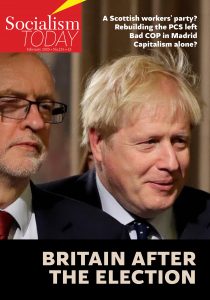
The decisive majority for Boris Johnson in December’s general election represents a turning point in Britain, all the consequences of which have yet to fully work themselves out. The British capitalist class still looks upon 2020 with trepidation. For them 2019 was a nightmare – with economic stagnation, a deadlocked and unpopular parliament, the risk of a chaotic Brexit, and above all the fear of the consequences of a Corbyn-led government. The fact that the Supreme Court intervened directly in politics – against a Tory prime minister – was a clear indication of the pitch of the crisis. The serious strategists of capitalism are now hoping that the election outcome will provide their class with some temporary stability or at least a breathing space. But even if this momentarily appears to be so, none of the underlying problems have been resolved and new crises will be posed in short order, which the capitalist class will not be able to trust Johnson to reliably deal with in their best interests.
Read more